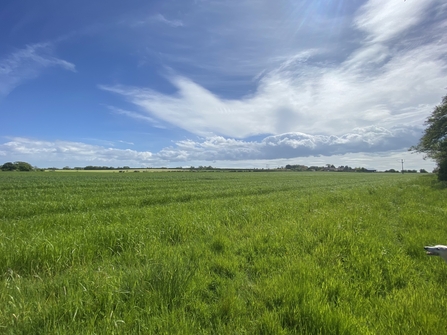
Earsdon West Forest. Image by Alice McCourt.

Earsdon West Forest. Image by Alice McCourt.
The Wildlife Trusts are set to be one of the largest providers of Biodiversity Net Gain with five active sites now registered, and over seventy sites proposed across forty-six local planning authorities - and they aim to raise the bar by setting a gold standard approach.
This means Wildlife Trusts are creating new strategic areas of wildlife habitats that are supporting large-scale nature recovery projects. These wild places are protected for nature and communities in perpetuity - well beyond the mandatory 30 years.
Additionally, wherever possible Wildlife Trusts are encouraging developers to go beyond the minimum 10% gain for wildlife and striving to deliver at least a 20% gain.
It is widely acknowledged that 10% is the bare minimum needed to maintain the status quo for nature. Given the catastrophic declines in nature over recent decades, clearly, greater ambition is needed.
Dr Rob Stoneman, Director of Landscape Recovery at The Wildlife Trusts, says:
“This new approach to development is successfully funding nature’s recovery and Wildlife Trusts across the country are working with developers to design thriving communities surrounded by beautiful, natural green space. We need to address the nature and climate crises while also ensuring that new homes can be built. With the UK Government’s plan to build 1.5 million homes, biodiversity net gain is a step in the right direction and must remain a central part of the planning process.
“Across England, Wildlife Trusts are also creating habitat banks - wildlife-rich sites available for developers to invest in. These support nature recovery, fund conservation efforts, and provide community access to stunning wild places. We’re calling on the UK Government to expand mandatory biodiversity net gain to Nationally Significant Infrastructure Projects - this would ensure that our natural infrastructure is re-established alongside energy and transport infrastructure.”
Nature-rich areas are known to be better places to live and work, improving people’s health and wellbeing. If developers are not able to enhance wildlife on-site, they can meet the requirement by purchasing biodiversity units, creating wildlife habitat, elsewhere.
Alice McCourt, Biodiversity Net Gain Manager at Northumberland Wildlife Trust, says:
“Biodiversity Net Gain offers us an exciting new way to fund our work in bigger and better ways. It gives us the opportunity to scale up our impact to nature’s recovery through habitat creation and ecological connectivity in a way we might not achieve otherwise. We are right at the start of our Biodiversity Net Gain journey, and we’re eager to see where it leads us.”
Northumberland Wildlife Trust is currently working towards securing a legal agreement for our first Biodiversity Net Gain site, with more planned for the near future:
For more information visit www.nwt.org.uk/what-we-do/professional-services/biodiversity-net-gain or complete the BNG enquiry form at www.nwt.org.uk/what-we-do/professional-services/biodiversity-net-gain